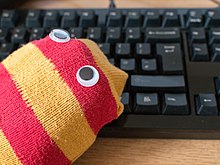A sock puppet account, in the context of online communities, refers to a deceptive practice where an individual creates multiple user profiles or identities on the same platform. This is often done to manipulate perceptions of popularity, credibility, or relevance. Notable historical figures like Walt Whitman, Anthony Burgess, and Benjamin Franklin have been known to use similar tactics before the advent of the internet[3]. Sock puppetry can be used for various purposes, such as circumventing bans, manipulating online polls, stealth marketing, and spreading propaganda. It's a practice that has legal implications and has been used in various sectors including politics, media, and social media[1]. The identification of sock puppet accounts often involves technical methods, such as IP address[2] comparison and writing style analysis. It's a complex issue that intertwines with other online threats, such as catfishing, phishing, and cyber attacks.
A sock puppet is a false online identity used for deceptive purposes. The term originally referred to a hand puppet made from a sock. Sock puppets include online identities created to praise, defend, or support a person or organization, to manipulate public opinion, or to circumvent restrictions such as viewing a social media account that a user is blocked from. Sock puppets are unwelcome in many online communities and forums.
